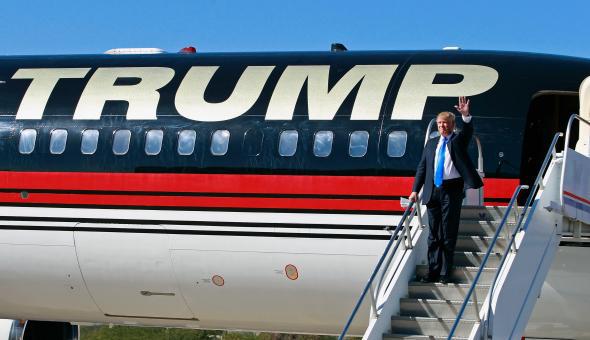It’s good to be Donald J. Trump. The real estate tycoon has won the past two Republican nominating contests, and the polls suggest he’s set to extend that winning streak on Tuesday night at Nevada’s GOP caucus. He’s currently up by an average of 16 percentage points on his nearest rival in the Silver State. Based on those polls, Nate Silver and his team at FiveThirtyEight peg Trump’s chances of winning the caucus at 78 percent. Anything other than another Trump victory speech would be a narrative-shifting surprise.
Still, those numbers come with some pretty massive caveats. The state is notoriously difficult to poll, given its transitory population and the fact that so many people work night shifts at casinos and hotels, making them unlikely to answer the phone when pollsters tend to call and generally making it more difficult for them to caucus if they were surveyed. There have been only two—two!—major GOP surveys conducted in Nevada this year, both of which are from before Jeb Bush dropped out of the race. (Bush was averaging about 5 percent support in the state.) Both of those found Trump as the heavy favorite, though the CNN poll found him with a 26-point lead on second-place Marco Rubio while the Gravis survey showed Trump with a 16-point advantage on second-place Ted Cruz. We think Trump is up, but we don’t know by how much or even which of his rivals is best positioned to deny him another momentum-building victory.
Also, while Trump is the clear polling leader in the state, he isn’t exactly known for the type of ground game seen as crucial to winning a caucus, where supporters need to spend considerably more time and energy than they do to vote in a traditional primary. That may have been what cost Trump Iowa, where he fell short of his average in that state’s caucus, losing to Cruz by 3 points despite leading the Texas senator in the polls by an average of 5 points heading into the night. Cruz and Rubio—currently averaging 23 percent and 19 percent in the Nevada polls, respectively—both exceeded expectations in Iowa and will hope to do the same in Nevada as they fight for the title of the man best suited to defeat Trump. (John Kasich would love to turn what now looks like a three-man race into a four-man one, but the Ohio governor’s stuck in the single digits in Nevada and will have to wait for friendlier terrain in the Midwest next month for anything good to happen to him. Ben Carson, meanwhile, would love for people to remember that he’s technically still running for president.)
Trump’s presence atop the polls isn’t the only thing causing uncertainty in Nevada. There also isn’t a lot of history to work with. The state wasn’t given its first-in-the-West status until 2008, and Mitt Romney was the runaway winner both that year and four years later thanks to heavy turnout among the state’s Mormon population. (Pollsters missed the mark badly on the first caucus go-round, too: Romney averaged around 26 percent in state polls in 2008 but went on to win with roughly twice that support.) Mormons—who accounted for roughly a quarter of GOP caucusgoers in 2012—don’t have an obvious choice in this year’s race, or as much motivation to show up in the same type of numbers.
Overall turnout is also a big question mark. About 44,000 Republicans showed up at the Nevada caucus in 2008, a number that dropped to 33,000 in 2012. For comparison, a record 180,000 Republicans caucused in Iowa at the start of this month. The Nevada GOP is desperate to set its own turnout record this year to preserve its fragile first-four status, but it hasn’t done itself any favors by not allowing same-day registration.
Oh, and one other thing: If Trump doesn’t run away with the victory, it could be a long night. In 2012, it took the state Republican Party several days to finish counting the paper ballots and officially award Newt Gingrich second place over Ron Paul. While the Nevada GOP has taken steps to avoid a similar embarrassment this time around, few are brimming with confidence. “It’s going to be scratchy no matter what,” former Nevada GOP Chairman James Smack told the Wall Street Journal this week. “We’re not like Iowa, where people have been doing this since the dawn of time.”
Read more Slate coverage of the GOP primary.
